August 1, 2022- July 31, 2023
The NH Disability and Health Program (NH DHP) focuses on seven strategies identified by the Centers for Disease Control and Prevention. This summary reports on the program activities for Year 2 of the current funding cycle (8/1/2022-7/31/2023) organized by strategy. Use the following links to navigate through this report.



NH DHP Joins Strafford County Public Health Network Coalition
Year 2 brought several new partnerships to NH DHP, one of which is Strafford County Public Health Network (SCPHN). NH DHP participates in monthly Healthy Living Coalition meetings facilitated by SCPHN. The group focuses on developing and discussing shared goals around improving food security and nutrition and decreasing the impact chronic disease has on the community living in Strafford County. The coalition is made up of representatives who work in healthcare, public health, chronic disease management, and food security. NH DHP is thrilled to engage with this group and bring a disability perspective to their work.
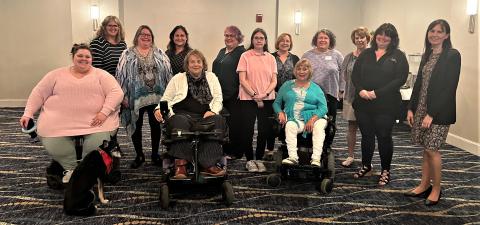
The Disability and Health Advisory Work Group (DHAWG) from June 2023. From left to right: Brittany Potvin, Deb Ritcey, Val Tetreault, Isadora Rodriquez-Legendre, Carol Conforti-Adams, Toni Sumner-Beebe, Kelly Ehrhart, Martha McLeod, Kathy Bates, Lisa Plotnik, Cindy Lafond, Jennifer Pineo, Megan Henly.
Spotlight: NH-ME LEND
NH DHP LEND Trainee Focuses on Transportation
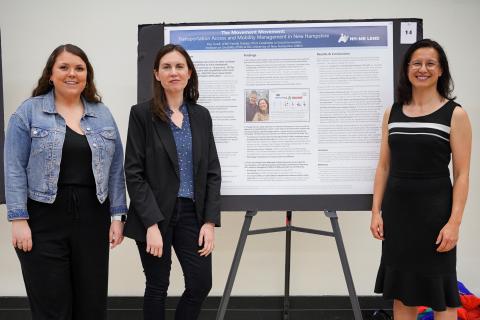
Emilia Poehlman, Megan Henly, and Yusi Turrell at the LEND Capstone event in May 2023.
Through feedback from the DHAWG and the needs assessments, DHP identified transportation as a barrier for adults with disabilities in NH to accessing health care and healthy living opportunities. NH DHP was thrilled to have Yusi Turrell, a graduate student in the NH-ME Leadership Education in Neurodevelopmental Disabilities (LEND) program, to learn more about this pressing issue.
Yusi developed a well-rounded understanding of the existing barriers to accessing transportation by conducting semi-structured interviews with transportation practitioners and disability advocates, completing focuses groups with the DHAWG and the Self Advocate Leadership Team (SALT), observing regional and state coordination meetings, and volunteering for the Ready Rides driver program herself.
Yusi identified three ways that DHP could contribute: amplifying disability perspectives within existing efforts, consolidating the Institute on Disability’s (IOD) transportation knowledge, and ensuring disability is represented in transportation advocacy by/for older adults.
As a result of Yusi’s assessment, DHP joined the Alliance for Community Transportation, the state-designated Regional Coordination Council (RCC) on transportation in southeast New Hampshire. In addition, the DHP team facilitates a quarterly IOD Transportation Working Group that unites several transportation-adjacent programs within the department so that in the future we may leverage the knowledge from colleagues also working in this area.



What is a milestone? Progress toward addressing barriers, gaps, and needs as acknowledged in the 2022 health and wellness needs assessments. This groundwork, ideally, should lead to meaningful, sustainable Policy, System, and Environmental changes.
DHP brings AdaptX Training to Granite YMCA
DHP is dedicated to creating more accessible and inclusive exercise opportunities to improve the health and wellbeing of adults with disabilities across the state. The Granite YMCA is an ally in this effort. This year, DHP supported Granite YMCA to have 14 personal trainers and group fitness instructors across the six branches receive AdaptX training.
The AdaptX Inclusive and Adaptive Fitness Certification Course allowed Granite YMCA staff to gain knowledge and confidence in better supporting clients with diverse cognitive, physical, and behavioral needs. Ben Boover, the Wellness Coordinator at the Granite YMCA Manchester branch, participated in the AdaptX training and shared about the impact, “It has been delightful to see changes we've made (because of AdaptX) bring smiles and accessibility…”.
The Granite YMCA is the largest YMCA in Northern New England. Their dedication to improving accessibility and inclusion has the potential to impact many people with disabilities in NH.
Spotlight: PATH Program
NEP PATH Program Uses Recreation Therapy to Serve Unmet Health Needs
NH DHP partnered with Northeast Passage (NEP) to address health equity for individuals in NH with mobility limitations through their individualized community-based recreational therapy services. Individuals met with a NEP Recreational Therapist to create a personal vision for increased health and wellbeing in physical, social, emotional, and environmental health categories. In follow up visits, participants worked with an NEP Recreational Therapist to actively explore strategies to create sustainable community engagement and recreation participation that supports desired family and social roles, aligns with personal identity, and increases physical health. Outcomes include increased participation in the community, increased quality of life and subjective happiness. Participants also expressed greater knowledge of community resources and confidence in their ability to access these things as part of personal health management. Individuals also identified greater flexibility in thinking related to their own beliefs and attitude toward disability, more frequent positive experiences, and creating more positive feelings in day-to-day life.
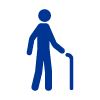


Healthcare Provider Training
Administer and evaluate a training for healthcare providers on accessible preventive health care



Responsive Practice Featured on CDC Learning Connection Website
In March “Responsive Practice: Providing Health Care & Screenings to Individuals with Disabilities” and “Responsive Practice: Accessible & Adaptive Communication” were featured on the Centers for Disease Control and Prevention’s Learning Connection website. The CDC Learning Connection helps public health and healthcare professionals stay informed about quality training from the CDC, other federal agencies, and federally funded partners. The CDC Learning Connection will also promote Responsive Practice via its newsletter and social media accounts. This outreach had a significant impact on the number of participants who completed the training in Year 2. Within 15 days of CDC Learning Connection’s launch of the trainings, 184 individuals completed the main module and 70 completed the communication module.
I just completed both training modules. Wow! They were really well done. I loved that you had people who are actually disabled explaining their experiences and acting in the role-plays to show the difference between effective and ineffective interactions.
It was especially helpful to see a diverse representation of actors—different ages and communication styles and also different types of people accompanying to appointments. The suggestions that were made are very applicable to working with all patients—not just those with disabilities. Everyone working in healthcare should complete these engaging and memorable training modules!
- Dulcinea Kaufman, DNP, RN, CNE Great Bay Community College Nursing Department Chair/Director
Linkage Project
Implement and evaluate a demonstration project to link adults with IDD to preventive health care and health promotion programs in their community



Linkage Project Recruitment
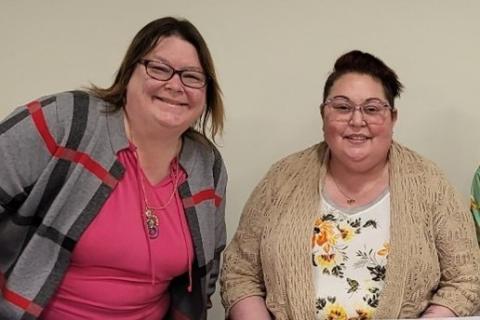
NH Linkage staff Val Tetrault and Michelle Lawrence attend the 3rd Regional Transition Fair.
The NH Linkage Project hired three new Linkage Coordinators in Year 2. This created an opportunity for the program to expand recruitment efforts. In the spring, the NH Linkage Team presented and answered questions at a monthly meeting of People First of NH. They were also able to attend the 3rd Regional Transition Fair at Community Bridges in April where they shared the Linkage Project with transition age youth, their families, and professionals who work with children and adults with IDD. The Linkage team identified new community locations such as libraries to share Linkage marketing materials and help inform people of the opportunity.



Living Well in the Community launches in New Hampshire
Granite State Independent Living (GSIL) hosted a Living Well in the Community (LWIC) workshop in the spring. Four participants enrolled in the workshop. Two participants completed the workshop. One of these participants stated that they were able to meet their health goal. When asked what the most helpful part of the workshop was one participant shared, “Being able to talk to people, feel included in something so that I don’t have to face it on my own.” After the workshop, the facilitators shared that they thought having two facilitators with disabilities benefited the workshop. For future workshops, they have shared that providing participants with activity books of the interactive lessons would likely improve the participant experience. This is input that NH DHP will consider as GSIL, Granite YMCA, and UNH Bridges implement the workshop in Year 3.



NH DHP Focuses on Coalition Building in Year 2
NH DHP identified oral health, food security & nutrition, and transportation as priority areas. Each topic area poses unique barriers for adults with disabilities to live healthy lives. In order to implement sustainable and impactful PSE changes, NH DHP recognizes the importance of identifying partners who are currently working and engaging in these areas.
To improve access to oral healthcare, NH DHP developed a partnership with NH Oral Health Coalition who presented to and brainstormed next steps with the DHAWG over the course of two meetings. The NH DHP Program Manager attended the NH Dental Society annual meeting to share Responsive Practice with providers and learn about barriers and limitations of their participation in the new Medicaid adult dental benefit. Additionally, NH DHP engaged in a stakeholder group organized by DentaQuest, Northeast Delta Dental’s partner in delivering the adult Medicaid dental benefit, to identify strategies to increase providers in the network and educate providers on the needs of patients with IDD.
NH DHP staff have developed a broader understanding of food security and transportation by attending regional and statewide meetings. This has allowed NH DHP staff to bring a disability perspective to larger conversations and identify partners for future PSE changes. To improve nutrition and food security, NH DHP has attended monthly NH Food Accesses Coalition and SNAP Coalition meetings facilitated by NH Hunger Solutions. Regionally, NH DHP has engaged with the SCPHN Health Living Coalition. To improve access to transportation for healthcare and healthy living opportunities, NH DHP has joined the Alliance for Community Transportation and participated in the Statewide Coordinating Council for Community Transportation.



NHPHA Uplifts Disability and Public Health Dialogue
In July, the NH Public Health Association shared an article written by DHP’s Program Manager in the association’s monthly newsletter. The article highlighted an infographic from the Association of State and Territorial Health Officials (ASTHO). In the article, readers were asked to consider if their existing public health programs were intentionally inclusive of people with disabilities. Readers were encouraged to identify ways in which they could create more accessible and inclusive programs. NH DHP offered support or assistance in helping public health professionals and programs increase accessibility and inclusion.
Looking Ahead
Year 3 goals, objectives, and partnerships
- Partnerships: NH DHP looks forward to continued collaboration and growth of the DHAWG. NH DHP will continue to gather input from the DHAWG to guide program activities.
- Needs Assessment: NH DHP staff will finalize and disseminate a supplemental needs assessment that will provide readers with a more in-depth understanding of barriers to nutritious, affordable food for people with disabilities in NH. NH DHP will leverage this report to encourage organizations currently addressing food security to consider the unique experience of people with disabilities. NH DHP will continue to support Northeast Passage’s PATH program which has proved to be impactful for bridging the gap in unmet health needs for adults with mobility limitations.
- Healthcare Provider Training: NH DHP plans to conduct outreach to health professional education programs to encourage faculty to incorporate Responsive Practice into their curriculum. Input from the DHAWG will guide additional efforts as NH DHP focuses efforts on having NH providers take the training.
- Linkage: The NH Linkage Team will identify new recruitment efforts including in person events and locations to share marketing materials. NH DHP will also leverage our partnership with Unite Us to utilize their health provider directory and platform for identifying health resources for those enrolled and for managing linkages.
- Evidence-Based Intervention: Granite State Independent Living will hold another LWIC workshop in Year 3. In addition, DHP is excited to support Granite YMCA in hosting their first workshop and the UNH Bridges program will integrate the Living Well into their curriculum on community.
- Policy, System, And Environmental (PSE) Changes: NH DHP will build upon the coalition building conducted in Year 2 to encourage PSE changes in oral health, food security/nutrition, and transportation. Additional opportunities for PSE changes within other partner organizations may present themselves throughout the year.
- Dissemination: NH DHP is excited to build upon work with NHPHA and create new, engaging opportunities to encourage accessible and inclusive practices by public health professionals and organizations.
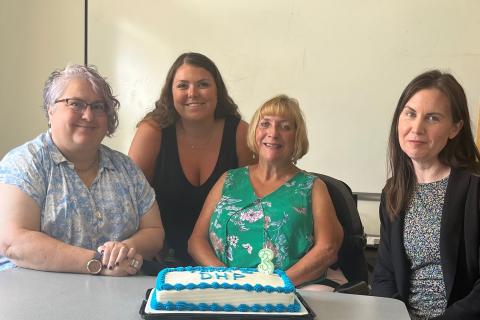
DHP Team celebrates the start of Year 3. From left to right: Toni Sumner-Beebe, Emilia Poehlman, Kathy Bates, and Megan Henly.
Acknowledgements
This publication was supported by cooperative agreement number DD000025 with the U.S. Centers for Disease Control and Prevention (CDC). Its contents are solely the responsibility of the authors and do not necessarily represent the views of CDC.
The program staff at the University of New Hampshire Institute on Disability (UNH IOD) gratefully acknowledges the many individuals, families, advocates, agencies, and organizations whose work to date has paved the way for current public health efforts, programs, and initiatives.
This summary was prepared by Megan Henly, PhD, and Emilia Poehlman, MSW at the UNH IOD. Thanks to DHP’s Kathy Bates and Toni Sumner-Beebe for their input and contribution towards program activities. Design and website support were provided by Kate Filanoski. Thanks also to the Disability and Health Advisory Work Group who were active in Year 2:
- Carol Conforti-Adams, Sunset Hill Education Institute
- Tiffany Crowell, RN, Bureau of Developmental Services
- Kelly Ehrhart, Self-Advocate
- John Fenley, Self-Advocate
- Joshua Gehling, NH Bureau of Developmental Services
- Whitney Hammond, NH Division of Public Health Services
- Cindy Lafond, Granite YMCA
- Jennifer McLaren, MD, Dartmouth-Hitchcock
- Martha McLeod, New Futures / New Hampshire Alliance for Healthy Aging
- Jennifer Pineo, NH Family Voices
- Lisa Plotnik, MD, Dartmouth-Hitchcock
- Brittany Potvin, Self-Advocate
- Laura Remick, North Country Health Consortium
- Deb Ritcey, MPA/HA, Granite State Independent Living
- Isadora Rodriguez-Legendre, MSW, NH Council on Developmental Disabilities
- Bob Scholz, MS, LMHC, Center for START Services
- Valarie Tetreault, MAPP, Community Bridges
- Tracy Walbridge, NH Family Voices